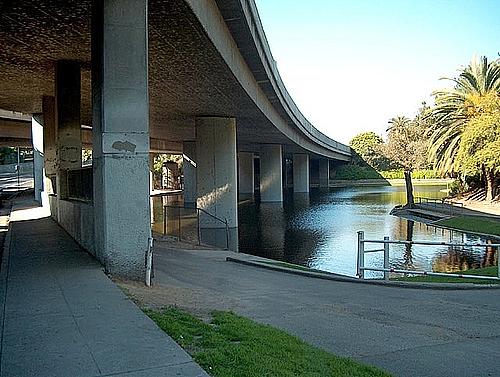My Favorite Tools for Keeping Up With People on the Internet

Hollenbeck Park is a lovely spot on the east side of Los Angeles. It's an historic place, built in 1892, and has since been a refuge for the evolving communities of Boyle Heights. Imagine a lake and boats and idyllic footbridges.
In the 1960s, Los Angeles put a freeway right through the park. Every time a Los Angeles driver speeds from the 5 freeway onto the 10 or curses while stuck in traffic on the ramp, they do so right above Hollenbeck Park. The interchange makes it possible for commuters to get through the east side without ever seeing the park or Boyle Heights.
(Photo of Hollenbeck Park by The City Project on Flickr Creative Commons)
What does any of this have to do with how journalists operate online? Last Friday, I explained the metaphor to this year's National Health Journalism Fellows. I understand that integrating connections with readers and sources and colleagues -- the constant need to communicate above and beyond each deadline -- seems like an impossible task to many journalists. But, I argued, spending some time with tools on the Internet can be an illuminating experience. When you take the side streets instead of the freeway, you might just discover some amazing things along the way.
Here are some of the resouces I use to integrate social media into my work, without letting it overtake my days.
If you're just starting out, I think it's helpful to understand the concept of RSS, or Real Simple Syndication. Think of it as a stream of content that you can step in and out of. It's also a lifeline for those of us who are drowning in emails. A website's RSS feed lists its content as it is added. I subscribe to much more content than I will ever read and use Google Reader to organize it all in folders so I can call up the topics I want to read about when I need to.
Many of the fellows will be reporting on underserved communities that do not necessarily have a great web presence. For older sites or those that are not designed with RSS feeds, Page2RSS can create a feed that will alert you to new content on a page. Change Detection provides a similar service, but sends email alerts instead of creating an RSS feed. (Hat tip to the fellows for pointing this one out.)
It's true: Not every journalist wants to be on Twitter. And that's ok by me. Even if you don't want to create a Twitter account you might still benefit from keeping up with your sources' tweets. Twitter used to provide RSS feeds on profile pages (which you could only see when you weren't logged in), but recently took them down. You can still find those feeds online, however. Simply type this address into your browser, replacing USERNAME with the Twitter handle of the account you want to follow: http://api.twitter.com/1/statuses/user_timeline.rss?screen_name=USERNAME
Google+ is a bit too new to really dissect, but there are two features I have found interesting for journalists. One is the webcam powered hangout. See Mashable's explanation of how it could be a great way to connect with readers. The other is search, which ironically has not yet been integrated into the Google social network just yet. But if you are using Chrome, you can create custom searchs to find posts and profiles. Business Insider explains how.
There's nothing like making a personal connection with a source to get information flowing. But if you're drowing in your inbox, it can get pretty difficult to remember your prior conversations, or anything about the person who has emailed you. For Gmail users, I highly recommend Rapportive, a browser extension that gives you extra information right next to emails. If you're Facebook friends with the person who sent you an email, it will show you their recent posts. If you are linked to them on LinkedIn, it will show you their employment information. It also shows Twitter feeds and any notes you have made.
Here are a few posts from Career GPS vis-à-vis how journalists might (or might not) integrate social media into their work:
Facebook for Journalists: Yay or Nay?
SXSW Interactive: Examining health and Facebook with Aimee Roundtree
So you're on Twitter and Facebook? What next?
And from the Reynolds Center for Business Journalism:
Quick video demo: Finding sources on LinkedIn, Twitter and Quora
And here's more about Hollenbeck Park from the Boyle Heights History Blog.
What are your favorite tools for keeping up with sources and colleagues online? Share in comments.

